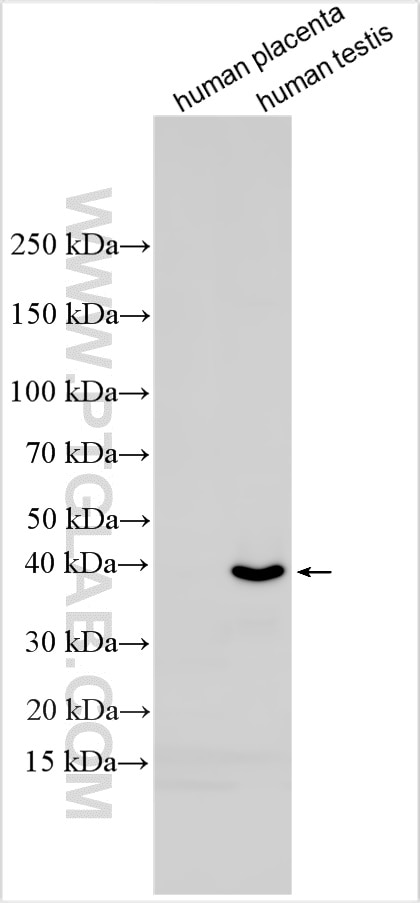Tested Applications
| Positive WB detected in | human testis tissue |
Recommended dilution
| Application | Dilution |
|---|---|
| Western Blot (WB) | WB : 1:1000-1:6000 |
| It is recommended that this reagent should be titrated in each testing system to obtain optimal results. | |
| Sample-dependent, Check data in validation data gallery. | |
Product Information
31923-1-AP targets HDGFL1 in WB, ELISA applications and shows reactivity with human samples.
| Tested Reactivity | human |
| Host / Isotype | Rabbit / IgG |
| Class | Polyclonal |
| Type | Antibody |
| Immunogen | HDGFL1 fusion protein Ag36944 Predict reactive species |
| Full Name | hepatoma derived growth factor-like 1 |
| Calculated Molecular Weight | 27 kDa |
| Observed Molecular Weight | 40 kDa |
| GenBank Accession Number | NM_138574 |
| Gene Symbol | HDGFL1 |
| Gene ID (NCBI) | 154150 |
| RRID | AB_3670147 |
| Conjugate | Unconjugated |
| Form | Liquid |
| Purification Method | Antigen affinity Purification |
| UNIPROT ID | Q5TGJ6 |
| Storage Buffer | PBS with 0.02% sodium azide and 50% glycerol , pH 7.3 |
| Storage Conditions | Store at -20°C. Stable for one year after shipment. Aliquoting is unnecessary for -20oC storage. 20ul sizes contain 0.1% BSA. |
Background Information
Hepatoma-derived growth factor-like 1 (HDGFL1, also known as HRP-1, PWWP1, and Hdgfrp1) is a member of the hepatoma-derived growth factor (HDGF) family related to tumorigenesis and the development of cancer (PMID: 18823380; 20509080). It is specifically expressed in the testis and activated in the nucleus (PMID: 22217008).
Protocols
| Product Specific Protocols | |
|---|---|
| WB protocol for HDGFL1 antibody 31923-1-AP | Download protocol |
| Standard Protocols | |
|---|---|
| Click here to view our Standard Protocols |



